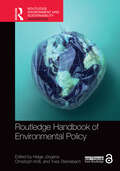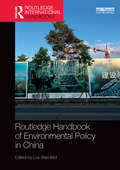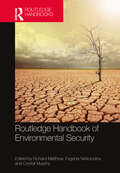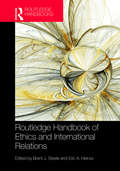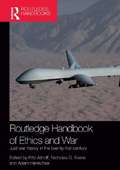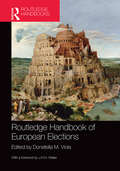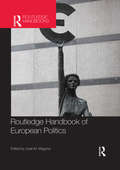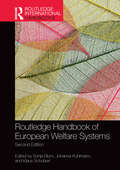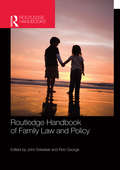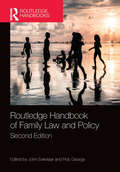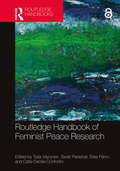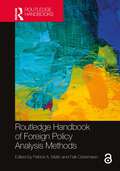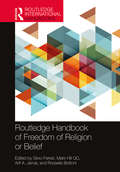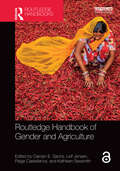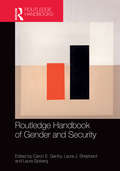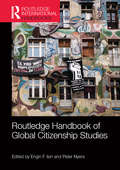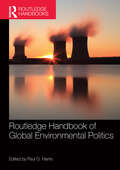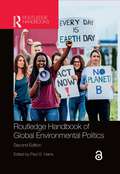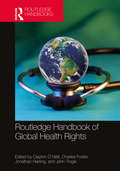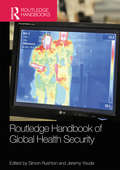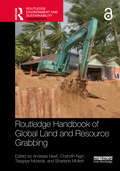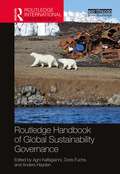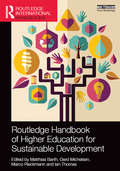- Table View
- List View
Routledge Handbook of Environmental Policy (Routledge Environment and Sustainability Handbooks)
by Helge Jörgens Christoph Knill Yves SteinebachThis Handbook provides a state-of-the-art review of research on environmental policy and governance. The Routledge Handbook of Environmental Policy has a strong focus on new problem structures – a perspective that emphasizes the preconditions and processes of environmental policymaking – and a comparative approach that covers all levels of local, national, and global policymaking. The volume examines the different conditions under which environmental policymaking takes place in different regions of the world and tracks the theoretical, conceptual, and empirical developments that have been made in recent years. It also highlights emerging areas where new and/or additional research and reflection are warranted. Divided into four key parts, the accessible structure and the nature of the contributions allow the reader to quickly find a concise expert review on topics that are most likely to arise in the course of conducting research or developing policy, and to obtain a broad, reliable survey of what is presently known about the subject. The resulting compendium is an essential resource for students, scholars, and policymakers working in this vital field.
Routledge Handbook of Environmental Policy in China (Routledge Environment and Sustainability Handbooks)
by Eva SternfeldDuring the last few decades, China has accomplished unprecedented economic growth and has emerged as the second largest economy in the world. This ‘economic miracle’ has led hundreds of millions of people out of poverty, but has also come at a high cost. Environmental degradation and the impact of environmental pollution on health are nowadays issues of the greatest concern for the Chinese public and the government. The Routledge Handbook of Environmental Policy in China focuses on the environmental challenges of China’s rapidly growing economy and provides a comprehensive overview of the policies developed to address the environmental crisis. Leading international scholars and practitioners examine China’s environmental governance efforts from an interdisciplinary perspective. Divided into five parts, the handbook covers the following key issues: Part I: Development of Environmental Policy in China - Actors and Institutions Part II: Key issues and Strategies for Solution Part III: Policy Instruments and Enforcement Part IV: Related Policy Fields – Conflicts and Synergies Part V: China’s Environmental Policy in the International Context This comprehensive handbook will be an invaluable resource to students and scholars of environmental policy and politics, development studies, Chinese studies, geography and international relations.
Routledge Handbook of Environmental Security
by Richard Matthew Evgenia Nizkorodov Crystal Murphy Kristen A. Goodrich Ashley Hooper Bemmy Maharramli Maureen J. Purcell Paroma WagleThe Routledge Handbook on Environmental Security provides a comprehensive, accessible, and sophisticated overview of the field of environmental security. The volume outlines the defining theories, major policy and programming interventions, and applied research surrounding the relationship between the natural environment and human and national security. Through the use of large-scale research and ground-level case analyses from across the globe, it details how environmental factors affect human security and contribute to the onset and continuation of violent conflict. It also examines the effects of violent conflict on the social and natural environment and the importance of environmental factors in conflict resolution and peacebuilding. Organized around the conflict cycle, the handbook is split into four thematic sections: • Section I: Environmental factors contributing to conflict; • Section II: The environment during conflict; • Section III: The role of the environment in post-conflict peacebuilding; and • Section IV: Cross-cutting themes and critical perspectives. This handbook will be essential reading for students of environmental studies, human security, global governance, development studies, and international relations in general.
Routledge Handbook of Ethics and International Relations
by Brent J. Steele Eric HeinzeEthics and International Relations (IR), once considered along the margins of the IR field, has emerged as one of the most eclectic and interdisciplinary research areas today. Yet the same diversity that enriches this field also makes it a difficult one to characterize. Is it, or should it only be, the social-scientific pursuit of explaining and understanding how ethics influences the behaviours of actors in international relations? Or, should it be a field characterized by what the world should be like, based on philosophical, normative and policy-based arguments? This Handbook suggests that it can actually be both, as the contributions contained therein demonstrate how those two conceptions of Ethics and International Relations are inherently linked. Seeking to both provide an overview of the field and to drive debates forward, this Handbook is framed by an opening chapter providing a concise and accessible overview of the complex history of the field of Ethics and IR, and a conclusion that discusses how the field may progress in the future and what subjects are likely to rise to prominence. Within are 44 distinct and original contributions from scholars teaching and researching in the field, which are structured around 8 key thematic sections: Philosophical Resources International Relations Theory Religious Traditions International Security and Just War Justice, Rights and Global Governance International Intervention Global Economics Environment, Health and Migration Drawing together a diverse range of scholars, the Routledge Handbook of Ethics and International Relations provides a cutting-edge overview of the field by bringing together these eclectic, albeit dynamic, themes and topics. It will be an essential resource for students and scholars alike.
Routledge Handbook of Ethics and War: Just War Theory in the 21st Century (Routledge International Handbooks)
by Fritz Allhoff Nicholas G. Evans Adam HenschkeThis new Handbook offers a comprehensive overview of contemporary extensions and alternatives to the just war tradition in the field of the ethics of war. The modern history of just war has typically assumed the primacy of four particular elements: jus ad bellum, jus in bello, the state actor, and the solider. This book will put these four elements under close scrutiny, and will explore how they fare given the following challenges: • What role do the traditional elements of jus ad bellum and jus in bello—and the constituent principles that follow from this distinction—play in modern warfare? Do they adequately account for a normative theory of war? • What is the role of the state in warfare? Is it or should it be the primary actor in just war theory? • Can a just war be understood simply as a response to territorial aggression between state actors, or should other actions be accommodated under legitimate recourse to armed conflict? • Is the idea of combatant qua state-employed soldier a valid ethical characterization of actors in modern warfare? • What role does the technological backdrop of modern warfare play in understanding and realizing just war theories?Over the course of three key sections, the contributors examine these challenges to the just war tradition in a way that invigorates existing discussions and generates new debate on topical and prospective issues in just war theory. This book will be of great interest to students of just war theory, war and ethics, peace and conflict studies, philosophy and security studies.
Routledge Handbook of European Elections
by Donatella M. ViolaThe Routledge Handbook of European Elections explores the multifaceted dimension of the European Parliament's (EP) electoral contests across the European Community and European Union since 1979. After setting a general empirical and theoretical framework, this collaborative project presents original contributions from leading experts from virtually all the corners of the European Union. Each case study adheres to a common template that makes it easy to compare data, methodology and outcomes. Every country chapter includes: a brief geopolitical profile and historical background of the Member State; a glance at the national political landscape; a short account of the main political parties, including their attitude toward the European Union; a section on public opinion and European integration; a summary of electoral systems; an overview of all EP and national elections; an in-depth analysis of the 2009 EP electoral race; an overall theoretical interpretation of European elections. A comparative chapter closes the Handbook followed by an Epilogue focussing on the 2014 EP contest with a detailed analysis of the newly elected European Assembly in terms of political group and gender compostion. The volume aims to enhance readers' understanding of the European Parliament and revive their interest in the European integration process. By providing a wide range of national and European facts and figures, this investigation represents a comprehensive reference guide to scholars, practitioners, and students of the European Parliament, European elections, political parties, European Union and comparative politics.
Routledge Handbook of European Politics
by José M. MagoneSince the Treaty of the European Union was ratified in 1993, the European Union has become an important factor in an ever-increasing number of regimes of pooled sovereignty. This Handbook seeks to present a valuable guide to this new and unique system in the twenty-first century, allowing readers to obtain a better understanding of the emerging multilevel European governance system that links national polities to Europe and the global community. Adopting a pan-European approach, this Handbook brings together the work of leading international academics to cover a wide range of topics such as: the historical and theoretical background the political systems and institutions of both the EU and its individual member nations political parties and party systems political elites civil society and social movements in European politics the political economy of Europe public administration and policy-making external policies of the EU. This is an invaluable and comprehensive resource for students, scholars, researchers and practitioners of the European Union, European politics and comparative politics.
Routledge Handbook of European Welfare Systems (Routledge International Handbooks)
by Klaus Schubert Johanna Kuhlmann Sonja BlumPublished ten years after the first edition, this new Handbook offers topical, and comprehensive information on the welfare systems of all 28 EU member states and their recent reforms, giving the reader an invaluable introduction and basis for comparative welfare research. Additional chapters provide detailed information on EU social policy, as well as comparative analyses of European welfare systems and their reform pathways. For this second edition, all chapters have been updated and substantially revised, and Croatia additionally included. The second edition of this Handbook is most timely, given the often-fundamental welfare state transformations against the background of the financial and economic crises, transforming social policy ideas, as well as political shifts in a number of European countries. The book sets out to analyse these new developments when it comes to social policy. In the first part, all country chapters provide systematic and comparable information on the foundations of the different national welfare systems and their characteristics. In the second part, using a joint conceptual foundation, they focus on policy changes (especially of the last two decades) in different social policy areas, including old-age, labour market, family, healthcare, and social assistance policies. As the comparative chapters conclude, European welfare system landscapes have been in constant motion in the last two decades. While austerity is not to be seen on the aggregate level, the in-depth country studies show that all policy sectors have been characterised by different reform directions and ideas. The findings not only reveal both change and continuity, but also policy reversal as a distinct type that characterises social policy reform. The book provides a rich resource to the international welfare state research community, and is also useful for social policy teaching.
Routledge Handbook of European Welfare Systems (Routledge International Handbooks)
Published ten years after the first edition, this new Handbook offers topical, and comprehensive information on the welfare systems of all 28 EU member states and their recent reforms, giving the reader an invaluable introduction and basis for comparative welfare research. Additional chapters provide detailed information on EU social policy, as well as comparative analyses of European welfare systems and their reform pathways. For this second edition, all chapters have been updated and substantially revised, and Croatia additionally included. The second edition of this Handbook is most timely, given the often-fundamental welfare state transformations against the background of the financial and economic crises, transforming social policy ideas, as well as political shifts in a number of European countries. The book sets out to analyse these new developments when it comes to social policy. In the first part, all country chapters provide systematic and comparable information on the foundations of the different national welfare systems and their characteristics. In the second part, using a joint conceptual foundation, they focus on policy changes (especially of the last two decades) in different social policy areas, including old-age, labour market, family, healthcare, and social assistance policies. As the comparative chapters conclude, European welfare system landscapes have been in constant motion in the last two decades. While austerity is not to be seen on the aggregate level, the in-depth country studies show that all policy sectors have been characterised by different reform directions and ideas. The findings not only reveal both change and continuity, but also policy reversal as a distinct type that characterises social policy reform. The book provides a rich resource to the international welfare state research community, and is also useful for social policy teaching.
Routledge Handbook of Family Law and Policy
by John Eekelaar Rob GeorgeChanges in family structures, demographics, social attitudes and economic policies over the last sixty years have had a large impact on family lives and correspondingly on family law. This book provides global perspectives on the policy challenges facing family law and policy round the world. The chapters apply legal, sociological, demographic and social work research to explore the most significant issues that have been commanding the attention of family law policy-makers in recent years. Featuring contributions from a range of renowned global experts, the book draws on multiple jurisdictions and offers comparative analysis across a range of countries. The book addresses a range of issues including: the role of the state in supporting families and protecting the vulnerable children’s rights and parental authority sexual orientation and gender in family law the status of marriage and other forms of adult relationships divorce and separation and their consequences the relationship between civil law and the law of minority groups assisted conception movement of family members between jurisdictions This advanced level reference work will be essential reading for students, researchers and scholars of family law and social policy as well as policy makers in the field.
Routledge Handbook of Family Law and Policy, 2nd edition
by John Eekelaar Rob GeorgeChanges in family structures, demographics, social attitudes and economic policies over the last sixty years have had a large impact on family lives and correspondingly on family law. The second edition of this Handbook draws upon recent developments to provide a comprehensive and up-to-date global perspective on the policy challenges facing family law and policy round the world.The chapters apply legal, sociological, demographic and social work research to explore the most significant issues that have been commanding the attention of family law policy-makers in recent years. Featuring contributions from a range of renowned global experts, the book draws on multiple jurisdictions and offers comparative analysis across a range of countries. The book addresses a range of issues including the role of the state in supporting families and protecting the vulnerable, children’s rights and parental authority, sexual orientation, same-sex unions and gender in family law, the status of marriage and other forms of adult relationships. It also focuses on divorce and separation and their consequences, the relationship between civil law and the law of minority groups, refugees, migrants and movement of family members between jurisdictions along with assisted conception, surrogacy and adoption. This advanced level reference work will be essential reading for students, researchers and scholars of family law and social policy as well as policy makers in the field.
Routledge Handbook of Feminist Peace Research
by Tarja VäyrynenThis handbook provides a comprehensive overview of feminist approaches to questions of violence, justice, and peace. The volume argues that critical feminist thinking is necessary to analyse core peace and conflict issues and is fundamental to thinking about solutions to global problems and promoting peaceful conflict transformation. Contributions to the volume consider questions at the intersection of feminism, gender, peace, justice, and violence through interdisciplinary perspectives. The handbook engages with multiple feminisms, diverse policy concerns, and works with diverse theoretical and methodological contributions. The volume covers the gendered nature of five major themes: • Methodologies and genealogies (including theories, concepts, histories, methodologies) • Politics, power, and violence (including the ways in which violence is created, maintained, and reproduced, and the gendered dynamics of its instantiations) • Institutional and societal interventions to promote peace (including those by national, regional, and international organisations, and civil society or informal groups/bodies) • Bodies, sexualities, and health (including sexual health, biopolitics, sexual orientation) • Global inequalities (including climate change, aid, global political economy). This handbook will be of great interest to students of peace and conflict studies, security studies, feminist studies, gender studies, international relations, and politics.
Routledge Handbook of Foreign Policy Analysis Methods
by Patrick A. Mello Falk OstermannThe disintegration and questioning of global governance structures and a re-orientation toward national politics combined with the spread of technological innovations such as big data, social media, and phenomena like fake news, populism, or questions of global health policies make it necessary for the introduction of new methods of inquiry and the adaptation of established methods in Foreign Policy Analysis (FPA). This accessible handbook offers concise chapters from expert international contributors covering a diverse range of new and established FPA methods. Embracing methodological pluralism and a belief in the value of an open discussion about methods’ assumptions and diverging positions, it provides new, state-of-the-art research approaches, as well as introductions to a range of established methods. Each chapter follows the same approach, introducing the method and its development, discussing strengths, requirements, limitations, and potential pitfalls while illustrating the method’s application using examples from empirical research. Embracing methodological pluralism and problem-oriented research that engages with real-world questions, the authors examine quantitative and qualitative traditions, rationalist and interpretivist perspectives, as well as different substantive backgrounds. The book will be of interest to a wide range of scholars and students in global politics, foreign policy, and methods-related classes across the social sciences. Chapters 4, 25 and 32 of this book are available for free in PDF format as Open Access from the individual product page at www.routledge.com. It has been made available under a Creative Commons Attribution-Non Commercial-No Derivatives 4.0 license.
Routledge Handbook of Freedom of Religion or Belief (Routledge International Handbooks)
by Rossella Bottoni Silvio Ferrari Mark Hill Arif A. JamalFreedom of religion is an issue of universal interest and scope. However, in the last two centuries at least, the philosophical, religious and legal terms of the question have been largely defined in the West. In an increasingly global world, widening our knowledge of this right’s roots in different cultural and legal systems becomes a priority. This Handbook seeks to attain this goal through a better understanding of the historical roots and expressions of the right to freedom of religion on the one hand and, on the other, of its theological background in different religious traditions. History and theology provide the setting for the analysis of the politics of freedom of religion, that is, how this right is used in the context of the dialogue/confrontation between countries placed in different cultural regions of the world, and of the legal strategies and tools that have been developed and are employed to protect and foster the right to freedom of religion. Behind these legal and political strategies, there is an ongoing debate about the nature of this right, whose main features are explored in the final section. Global, historical and interdisciplinary in approach, this book studies the new relevance of freedom of religion worldwide and develops suitable categories to analyze and understand the role that freedom of religion can play in managing religious and cultural diversity in our societies. Authored by experts, through the contributions collected in these chapters, scholars and students will be able to broaden and deepen their knowledge of the right to freedom of religion and to develop the ability to go beyond the borders of the different cultural environments in which this right took shape and developed.
Routledge Handbook of Gender and Agriculture
by Carolyn E. Sachs, Leif Jensen, Paige Castellanos, and Kathleen SexsmithThe Routledge Handbook of Gender and Agriculture covers major theoretical issues as well as critical empirical shifts in gender and agriculture. Gender relations in agriculture are shifting in most regions of the world with changes in the structure of agriculture, the organization of production, international restructuring of value chains, climate change, the global pandemic, and national and multinational policy changes. This book provides a cutting-edge assessment of the field of gender and agriculture, with contributions from both leading scholars and up-and-coming academics as well as policymakers and practitioners. The handbook is organized into four parts: part 1, institutions, markets, and policies; part 2, land, labor, and agrarian transformations; part 3, knowledge, methods, and access to information; and part 4, farming people and identities. The last chapter is an epilogue from many of the contributors focusing on gender, agriculture, and shifting food systems during the coronavirus pandemic. The chapters address both historical subjects as well as ground-breaking work on gender and agriculture, which will help to chart the future of the field. The handbook has an international focus with contributions examining issues at both the global and local levels with contributors from across the world. With contributions from leading academics, policymakers, and practitioners, and with a global outlook, the Routledge Handbook of Gender and Agriculture is an essential reference volume for scholars, students, and practitioners interested in gender and agriculture.
Routledge Handbook of Gender and Security
by Laura Sjoberg Laura J. Shepherd Caron E. GentryThis handbook provides a comprehensive look at the study of gender and security in global politics. The volume is based on the core argument that gender is conceptually necessary to thinking about central questions of security; analytically important for thinking about cause and effect in security; and politically important for considering possibilities of making the world better in the future. Contributions to the volume look at various aspects of studying gender and security through diverse lenses that engage diverse feminisms, with diverse policy concerns, and working with diverse theoretical contributions from scholars of security more broadly. It is grouped into four thematic sections: Gendered approaches to security (including theoretical, conceptual, and methodological approaches); Gendered insecurities in global politics (including the ways insecurity in global politics is distributed and read on the basis of gender); Gendered practices of security (including how policy practice and theory work together, or do not); Gendered security institutions (across a wide variety of spaces and places in global politics). This handbook will be of great interest to students of gender studies, security studies and IR in general.
Routledge Handbook of Gender and Water Governance (Routledge Environment and Sustainability Handbooks)
by Margreet Zwarteveen Tatiana Acevedo-Guerrero Lisa Bossenbroek Irene Leonardelli Seema KulkarniThis handbook provides a comprehensive overview of the field of gender and water governance, exploring how the use, management and knowledge of water resources, services and the water environment are deeply gendered.In water there is a recognized gender gap between water responsibilities and water rights and bridging this gap is likely to help achieve not just goals of equity but also those of sustainability. Building on a rich legacy of feminist water scholarship, the Routledge Handbook of Gender and Water Governance is a collection of reflections and studies that can be used as a prismatic lens into a thriving and ever proliferating array of feminist water studies. It provides a clear testimony of how hydrofeminism has evolved from rather instrumental gender and water studies to scholarship that uses feminist tools to pry open, critically reflect on and formulate alternatives to water development-as-usual. The book also shows how the community of feminists interested in studying water has diversified and expanded, from often white female scholars studying projects and gender relations in the so-called Global South, to a varied mix of scholars and activists theorizing from diverse geographical and political locations – prominently including the body. It is organized into five interconnected parts: Part I: Positionality and embodied waters Part II: Revisiting water debates: diplomacy, security, justice and heritage Part III: Sanitation stories Part IV: Precarious livelihoods Part V: New feminist futures Each of these parts brings out the gendered nature of water, shedding light on the often neglected care and unpaid labour of women and its relationship with extractivism and socioeconomic inequalities. The overall aim of the handbook is to apply social science insights to water governance challenges, creating synergies and linkages between different disciplines and scientific domains.The Routledge Handbook of Gender and Water Governance is essential reading for students, scholars and professionals interested in water governance, water security, health and sanitation, gender studies and sustainable development more broadly.
Routledge Handbook of Global Citizenship Studies (Routledge International Handbooks)
by Engin F. Isin Peter NyersCitizenship studies is at a crucial moment of globalizing as a field. What used to be mainly a European, North American, and Australian field has now expanded to major contributions featuring scholarship from Latin America, Asia, Africa, and the Middle East. The Routledge Handbook of Global Citizenship Studies takes into account this globalizing moment. At the same time, it considers how the global perspective exposes the strains and discords in the concept of ‘citizenship’ as it is understood today. With over fifty contributions from international, interdisciplinary experts, the Handbook features state-of-the-art analyses of the practices and enactments of citizenship across broad continental regions (Africas, Americas, Asias and Europes) as well as deterritorialized forms of citizenship (Diasporicity and Indigeneity). Through these analyses, the Handbook provides a deeper understanding of citizenship in both empirical and theoretical terms. This volume sets a new agenda for scholarly investigations of citizenship. Its wide-ranging contributions and clear, accessible style make it essential reading for students and scholars working on citizenship issues across the humanities and social sciences.
Routledge Handbook of Global Environmental Politics
by Paul G. HarrisThis handbook provides a comprehensive and authoritative survey of Global Environmental Politics. It brings together leading international academic experts and features 40 chapters that: Describe the history of global environmental politics as a discipline and explain the various theories and perspectives used by scholars and students to understand it. Examine the key actors and institutions in global environmental politics, explaining the role of states, international organizations, regimes, international law, foreign policy institutions, domestic politics, corporations and transnational actors. Address the ideas and themes shaping the practice and study of global environmental politics, including sustainability, consumption, expertise, uncertainty, security, diplomacy, North-South relations, globalisation, justice, ethics, participation and citizenship. Assess the key issues and policies within global environmental politics, including energy, climate change, ozone depletion, air pollution, acid rain, sustainable transport, persistent organic pollutants, hazardous wastes, water, rivers, wetlands, oceans, fisheries, marine mammals, biodiversity, migratory species, natural heritage, forests, desertification, food and agriculture. With an in-depth new preface by the Editor, this edition of the handbook is an invaluable resource for students, scholars, researchers and practitioners of environmental politics, environmental studies, environmental science, geography, international relations and political science.
Routledge Handbook of Global Environmental Politics
by Paul G. HarrisThis handbook brings together leading international academic experts to provide a comprehensive and authoritative survey of global environmental politics. Fully revised, updated and expanded to 45 chapters, the book: • Describes the history of global environmental politics as a discipline and explains the various theories and perspectives used by scholars and students to understand it. • Examines the key actors and institutions in global environmental politics, explaining the roles of states, international organizations, regimes, international law, foreign policy institutions, domestic politics, corporations and transnational actors. • Addresses the ideas and themes shaping the practice and study of global environmental politics, including sustainability, consumption, expertise, uncertainty, security, diplomacy, North-South relations, globalization, justice, ethics, public participation and citizenship. • Assesses the key issues and policies within global environmental politics, including energy, climate change, ozone depletion, air pollution, acid rain, transport, persistent organic pollutants, hazardous wastes, rivers, wetlands, oceans, fisheries, marine mammals, biodiversity, migratory species, natural heritage, forests, desertification, food and agriculture. This second edition includes new chapters on plastics, climate change, energy, earth system governance and the Anthropocene. It is an invaluable resource for students, scholars, researchers and practitioners of environmental politics, environmental studies, environmental science, geography, globalization, international relations and political science.
Routledge Handbook of Global Health Rights
by Clayton Ó Néill, Charles Foster, Jonathan Herring, and John TingleThis book examines the idea of a fundamental entitlement to health and healthcare from a human rights perspective. The volume is based on a particular conceptual reasoning that balances critical thinking and pragmatism in the context of a universal right to health. Thus, the primary focus of the book is the relationship or contrast between rights-based discourse/jurisprudential arguments and real-life healthcare contexts. The work sets out the constraints that are imposed on a universal right to health by practical realities such as economic hardship in countries, lack of appropriate governance, and lack of support for the implementation of this right through appropriate resource allocation. It queries the degree to which the existence of this legally enshrined right and its application in instruments such as the International Covenant on Economic, Social and Cultural Rights (ICESCR) and the Universal Declaration of Human Rights (UDHR) can be more than an ephemeral aspiration but can, actually, sustain, promote, and instil good practice. It further asks if social reality and the inequalities that present themselves therein impede the implementation of laudable human rights, particularly within marginalised communities and cadres of people. It deliberates on what states and global bodies do, or could do, in practical terms to ensure that such rights are moved beyond the aspirational and become attainable and implementable. Divided into three parts, the first analyses the notion of a universal inalienable right to health(care) from jurisprudential, anthropological, legal, and ethical perspectives. The second part considers the translation of international human rights norms into specific jurisdictional healthcare contexts. With a global perspective it includes countries with very different legal, economic, and social contexts. Finally, the third part summarises the lessons learnt and provides a pathway for future action. The book will be an invaluable resource for students, academics, and policymakers working in the areas of health law and policy, and international human rights law.
Routledge Handbook of Global Health Security
by Jeremy Youde Simon RushtonThis new Handbook presents an overview of cutting-edge research in the growing field of global health security. Over the past decade, the study of global health and its interconnection with security has become a prominent and rapidly growing field of research. Ongoing debates question whether health and security should be linked; which (if any) health issues should be treated as security threats; what should be done to address health security threats; and the positive and negative consequences of ‘securitizing’ health. In academic and policy terms, the health security field is a timely and dynamic one and this handbook will be the first work comprehensively to address this agenda. Bringing together the leading experts and commentators on health security issues from across the world, the volume comprises original and cutting-edge essays addressing the key issues in the field and also highlighting currently neglected avenues for future research. The book intends to provide an accessible yet sophisticated introduction to the key topics and debates and is organised into four key parts: Health Securities: the fundamental conceptual issues, historical links between health and security and the various ways of conceptualising health as a security issue Threats: those health issues which have been most frequently discussed in security terms Responses: the wide range of contemporary security-driven responses to health threats Controversies: the securitization of health, its impact on rights and justice and the potential distortion of the global health agenda This book will be of great interest to students of global health security, public health, critical security studies, and International Relations in general.
Routledge Handbook of Global Land and Resource Grabbing (Routledge Environment and Sustainability Handbooks)
by Sharlene Mollett Andreas Neef Chanrith Ngin Tsegaye MoredaThis handbook provides a cutting-edge, comprehensive overview of global land and resource grabbing. Global land and resource grabbing has become an increasingly prominent topic in academic circles, among development practitioners, human rights advocates, and in policy arenas. The Routledge Handbook of Global Land and Resource Grabbing sustains this intellectual momentum by advancing methodological, theoretical and empirical insights. It presents and discusses resource grabbing research in a holistic manner by addressing how the rush for land and other natural resources, including water, forests and minerals, is intertwined with agriculture, mining, tourism, energy, biodiversity conservation, climate change, carbon markets, and conflict. The handbook is truly global and interdisciplinary, with case studies from the Global South and Global North, and chapter contributions from practitioners, activists and academics, with emerging and Indigenous authors featuring strongly across the chapters. The handbook will be essential reading for students and scholars interested in land and resource grabbing, agrarian studies, development studies, critical human geography, global studies and natural resource governance.
Routledge Handbook of Global Sustainability Governance (Routledge International Handbooks)
by Anders Hayden Agni Kalfagianni Doris FuchsThe Routledge Handbook of Global Sustainability Governance provides a state-of-the-art review of core debates and contributions that offer a more normative, critical, and transformatively aspirational view on global sustainability governance. In this landmark text, an international group of acclaimed scholars provides an overview of key analytical and normative perspectives, material and ideational structural barriers to sustainability transformation, and transformative strategies. Drawing on pivotal new and contemporary research, the volume highlights aspects to be considered and blind spots to be avoided when trying to understand and implement global sustainability governance. In this context, the authors of this book debunk many myths about all-too optimistic accounts of progress towards a sustainability transition. Simultaneously, they suggest approaches that have the potential for real sustainability transformation and systemic change, while acknowledging existing hurdles. The wide-ranging chapters in the collection are organised into four key parts: • Part 1: Conceptual lenses • Part 2: Ethics, principles, and debates • Part 3: Key challenges • Part 4: Transformative approaches This handbook will serve as an important resource for academics and practitioners working in the fields of sustainability governance and environmental politics.
Routledge Handbook of Higher Education for Sustainable Development (Routledge International Handbooks)
by Ian Thomas Gerd Michelsen Matthias Barth Marco RieckmannThe Routledge International Handbook of Higher Education for Sustainable Development gives a systematic and comprehensive overview of existing and upcoming research approaches for higher education for sustainable development. It provides a unique resource for researchers engaged in the field of higher education for sustainable development by connecting theoretical aspects of the range of relevant methodologies, showing the interdisciplinary aspects of the research field and illustrating the breadth of research directions. With a team of international authors from leading universities in research and teaching in higher education for sustainable development this Handbook brings together a broad range of research approaches and shows how these approaches are reflected in the research practice in higher education for sustainable development. Key topics include: Research Paradigms and Methodologies Ongoing and Future Directions of Research Meta-Analysis and Reviews Policy and Politics Challenges for Implementation Action Research and Transdisciplinary Perspective Gender, Diversity and Post-Colonial Perspectives Operationalising Competencies Outcome-Oriented Research Curriculum Change Organisational Change and Organisational Learning Community and Partnerships University Appraisal Systems and Indicators Evaluation Approaches Engaging Academic Teachers Good Practice Learning and Teaching Transformative Leadership and Change Strategies This Handbook is an invaluable research and teaching tool for all those working in higher education for sustainable development.
